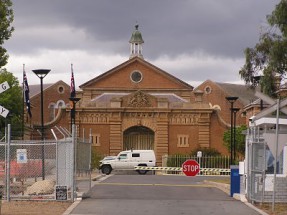
Notoriously overcrowded jails in New South Wales are primed for a major shake-down after a stinging Audit Office report found it was impossible to tell how well or badly individual public jails are doing because they were just not issued with key performance benchmarks to measure themselves against.
It’s an information vacuum so empty that on Thursday the state’s Minister for Corrections, David Elliott, revealed the Baird Government has now hired an “independent consultant” to urgently analyse “public prison operations in NSW and compare them to the private sector as well as public prisons in Queensland.”
Serious overcrowding in NSW jails has been an escalating issue for at least three years as existing facilities struggle to house growing numbers of offenders, resulting lockdowns because of a lack of correctional staff needed to supervise prisoners when they are out of their cells.
The issue of lockdowns and the long times spent by prisoners in overcrowded cells without the opportunity for exercise has exacerbated tensions between inmates and prison staff as well as prisons’ management and unions.
The powder keg environment has fuelled fears among many officers of an increased potential for outbreaks of violence and riots, especially after recent smoking bans. The tensions have also done little to help attract badly needed extra prison staff to a difficult job.
The Audit Report took particular aim at a tendency by prison management to put the welfare of inmates behind managing budgets.
“Compared to other jurisdictions, CSNSW [Corrective Services NSW] operates a low cost, low time out of cell system. In order to meet budget and staff-related KPIs, we found that General Managers reallocated staff and changed inmate routines to limit overtime expenses,” the Audit report said.
“On some days, this resulted in lockdowns and reduced time out of cells for inmates. While this approach reduces costs, it also presents additional risk to the system. For example, reduced time out of cells can reduce inmate welfare and increase the risk of inmate self-harm.”
On the back of the Audit Report, the Corrections Minister has vowed that new performance criteria and reporting standards will let the government allocate money to where it is needed.
“The analysis will identify the budget needed to achieve performance targets on indicators such as assaults on staff, time out of cells, engagement in inmate literacy and rehabilitation programs and other purposeful activity, and staff training hours,” a statement from Mr Elliott said.
“It is not good enough that we do not know which prisons are our star performers and which require more attention.”
The void of public prison data contrasted sharply with privately operated jails that must report extensively on their performance as part of their contract with the states.
Corrective Services Commissioner, Peter Severin, said the latest reforms “will ensure that public prisons are as accountable as private prisons.”
“This way of operating is standard across the private sector and in many other government agencies and it enables organisations to be more efficient and focus on their key goals,” Commissioner Severin said.
“I am confident Corrective Services NSW will be able to move successfully to this way of operating, which will be supported by an infrastructure renewal program.”
But while privately operated prisons appear outwardly more transparent and provide a lower cost alternative to authorities, deep concerns remain that running prisons as a business will ultimately have negative social consequences.
The crux of the debate is that businesses that operate prisons for a profit are inherently reliant on increasing prison populations to maintain growth, a factor that conflicts directly with social objectives of reducing offending rates and the custodial sentences that go with them.
In February UK private security services outsourcing firm G4S revealed it was selling its contracts to run a number of jails for children and young offenders – dubbed ‘Secure Training Facilities’ – after the BBC exposed staff using excessive force to restrain children.
Comment below to have your say on this story.
If you have a news story or tip-off, get in touch at editorial@governmentnews.com.au.
Sign up to the Government News newsletter


Are you kidding, try and get an accurate report from private prisons in regards to assaults both on staff and other inmates. It’s well known in prison circle that any type of drug is easily obtained in private gaols.While KPI’s are a suitable guide in many industries there are to many uncontrolled variables in gaols for them to work, eg assaults, drug od’s,inmates who don’t want to work or participate in programs.
I know for a fact an inmate laid dead in his cell at park lea prison for 24hrs last year, also the Inmate Reporting Module is unable to accessed by anyone other than the highest echelons of DCS. I have seen inmates off the planet on drugs and as an inmate said to me once you can gate whatever you want in park lea no matter who you are. Oh and don’t forget in the first six months of operations 6 officers were caught bringing contraband into the gaol.
This will be interesting to see where this goes, considering that Private Prisons don’t pay for half of the services etc that the Public Prisons do. For example, Private Prisons don’t pay for prisoner transport, inmate clothing, health care or infrastructure maintenance. On the Public side of the spectrum the public prisons have to pay for all inmate clothing (even the clothing that follows that inmate to a private prison), they have to pay for transport staff and transport vehicles to move prisons from one gaol to another, they have to pay for prisoners medical expenses (which is a state obligation anyway and is therefore passed from one government department to another, which is something that doesn’t happen to a Private Prison).
This system is floored before the process even starts! The privateers are at an unfair advantage. But in saying that, Junee CC (which is the cheapest private prison in NSW) still costs more to run than Wellington CC (which is a state run prison that pays for all of its own maintenance, transport and clothing costs).
Coincidentally centre management at the private prisons are earning two to three times the salary of centre management working in public prisons.
These are the inconvenient facts and figures that the privateers and the NSW Government don’t want people to know so as to justify further privatisation, despite privatisation failing to deliver tangible savings or reducing recidivism.